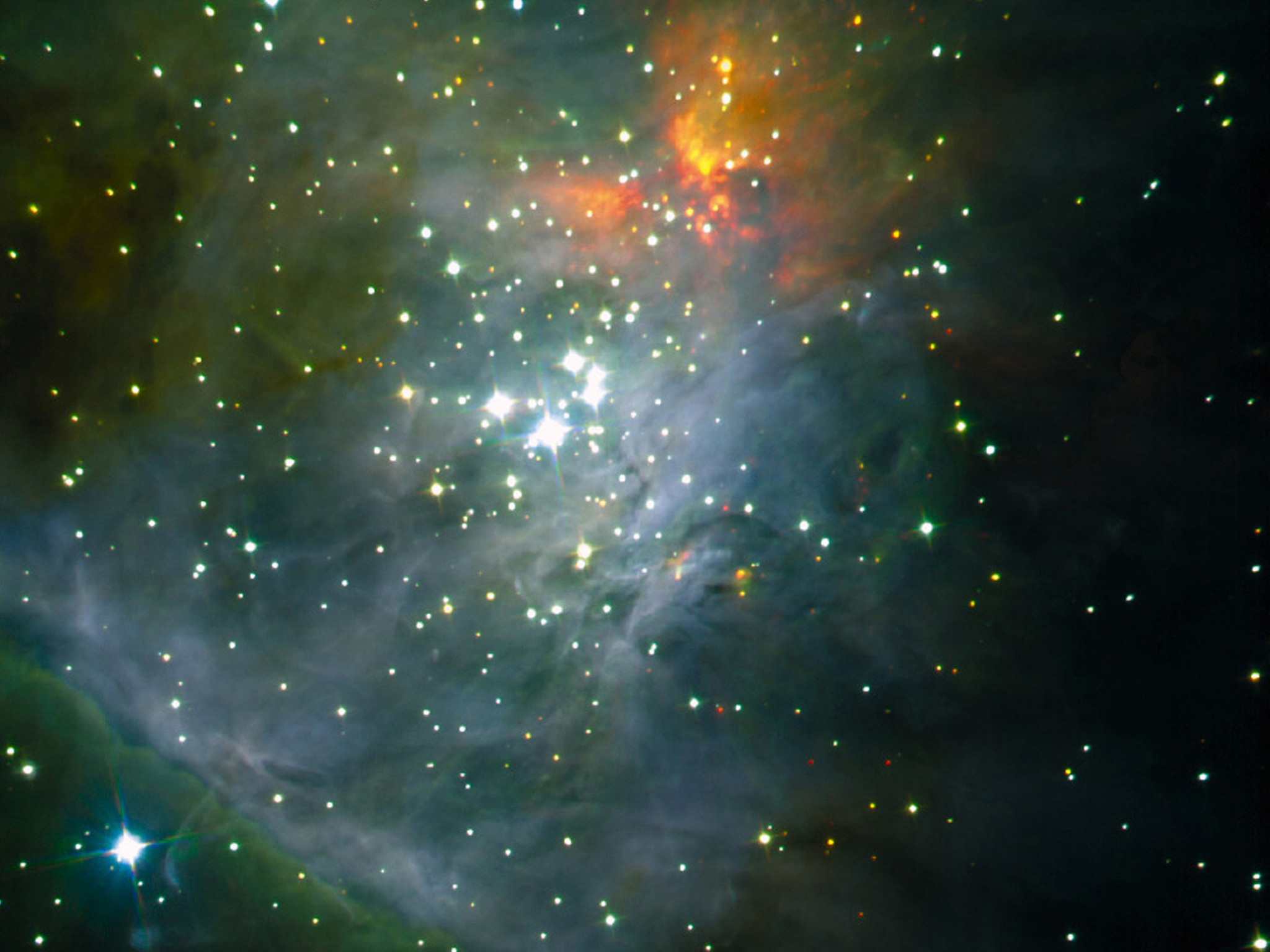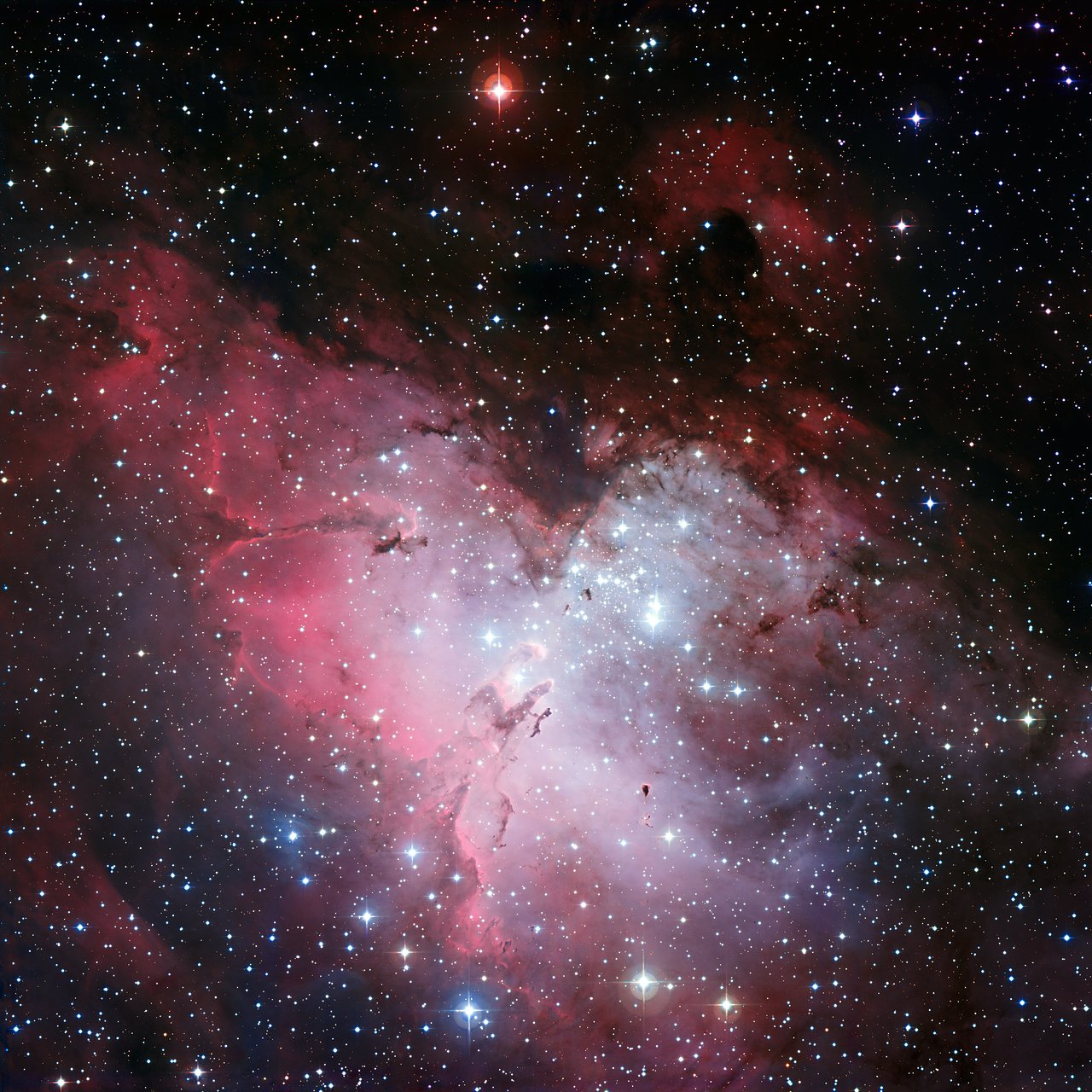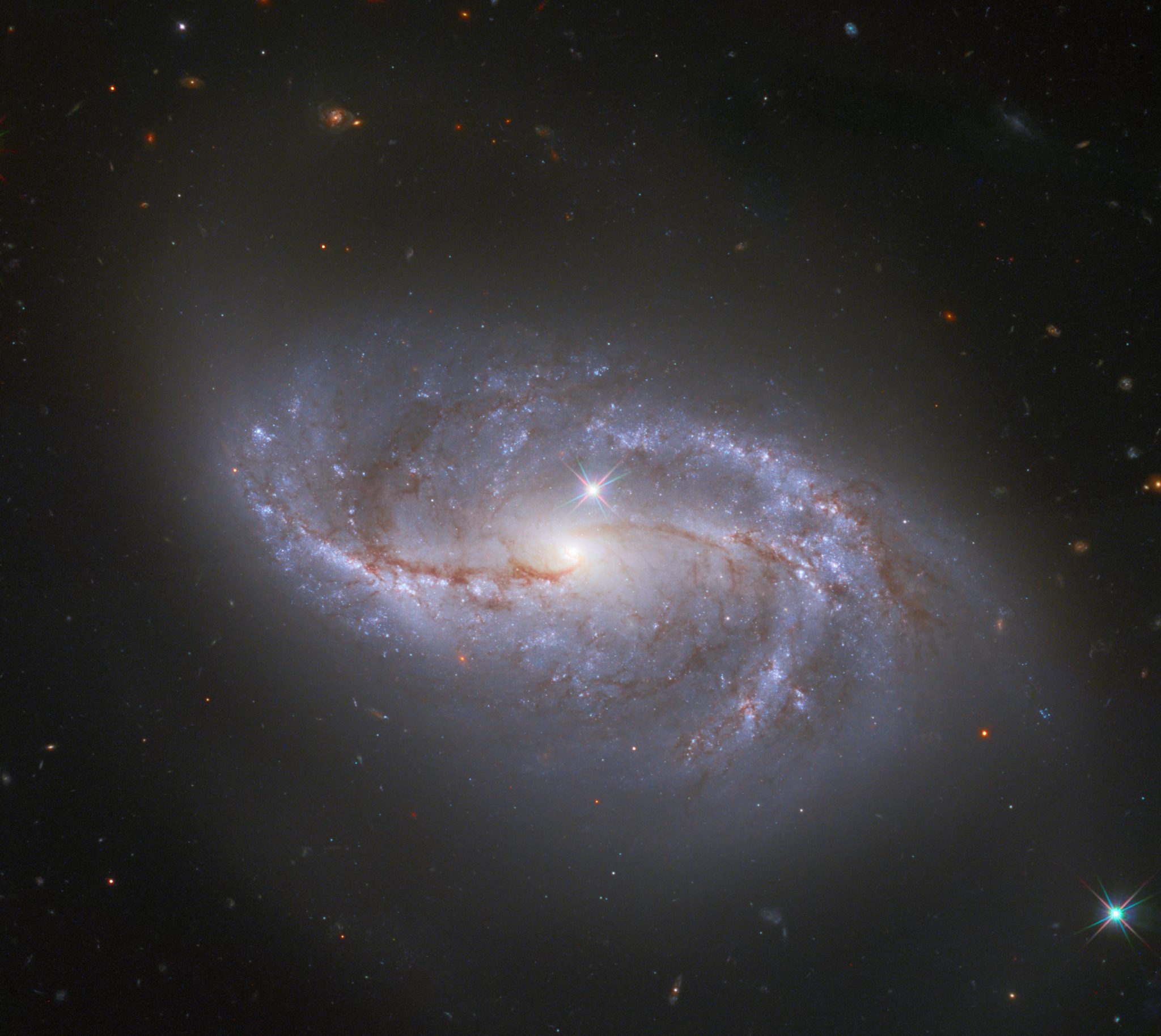Blog
The Trapezium cluster
This image shows a colour composite of near-infrared images of the central regions of the Orion Nebula, obtained on March 14, 2000, with the SOFI instrument at the ESO 3.5-m New Technology Telescope (NTT) at La Silla. Three exposures were made through J- (wavelength 1.25 µm here colour-coded as “blue”), H- (1.65 µm; “green”) and Ks-filters (2.16 µm; “red”), respectively. The central group of bright stars is the famous “Trapezium” . The total effective exposure time was 86.4 seconds per band. The sky field measures about 4.9 x 4.9 arcmin 2 (1024 x 1024 pix 2). North is up and East is left.

Gary Thomas (born June 10, 1961, Baltimore, Maryland) is an American jazz saxophonist and flautist from Baltimore, Maryland. He was a member of Jack DeJohnette‘s Special Edition band and has worked with John McLaughlin, Herbie Hancock, Pat Metheny, John Scofield, Jim Hall, Dave Holland, Greg Osby, Wayne Shorter, Ravi Coltrane, Cassandra Wilson, Wallace Roney, Steve Coleman, and Miles Davis.
Thomas was the Director and Chair of Jazz Studies at Johns Hopkins University in Baltimore.
more...Max Alfred “Maxi” Elliott (born 10 June 1961), known by his stage name Maxi Priest, is a British reggae vocalist of Jamaican descent. He is best known for singing reggae music with an R&B influence, otherwise known as reggae fusion. He was one of the first international artists to have success in this genre, and one of the most successful reggae fusion acts of all time.
Maxi Priest was born in Lewisham, London, the second youngest of nine brothers and sisters. His parents had moved to England from Jamaica to provide more opportunity for their family and he grew up listening to gospel, reggae, R&B, and pop music. He first learned to sing in church, encouraged by his mother, who was a Pentecostal missionary. Maxi grew up listening to Jamaican greats such as Dennis Brown, John Holt, Ken Boothe and Gregory Isaacs as well as singers like Marvin Gaye, Al Green, the Beatles, Phil Collins and Frank Sinatra.
more...João Gilberto (born João Gilberto Prado Pereira de Oliveira – Portuguese: [ʒuˈɐ̃w ʒiwˈbɛʁtu]; June 10, 1931 – July 6, 2019), was a Brazilian singer, songwriter, and guitarist, who was a pioneer of the musical genre of bossa nova in the late 1950s. Around the world he was often called “father of bossa nova”; in his native Brazil, he was referred to as “O Mito” (“The Legend”).
more...Chester Arthur Burnett (June 10, 1910 – January 10, 1976), known as Howlin’ Wolf, was a Chicago blues singer, guitarist, and harmonica player. Originally from Mississippi, he moved to Chicago in adulthood and became successful, forming a rivalry with fellow bluesman Muddy Waters. With a booming voice and imposing physical presence, he is one of the best-known Chicago blues artists. The musician and critic Cub Koda noted, “no one could match Howlin’ Wolf for the singular ability to rock the house down to the foundation while simultaneously scaring its patrons out of its wits.” Producer Sam Phillips recalled, “When I heard Howlin’ Wolf, I said, ‘This is for me. This is where the soul of man never dies.'” Several of his songs, including “Smokestack Lightnin’“, “Killing Floor” and “Spoonful“, have become blues and blues rock standards. In 2011, Rolling Stone magazine ranked him number 54 on its list of the “100 Greatest Artists of All Time“.
Chester Arthur Burnett was born on June 10, 1910, in White Station, Mississippi to Gertrude Jones and Leon “Dock” Burnett.He would later say that his father was “Ethiopian”, while Jones had Choctaw ancestry on her father’s side. He was named for Chester A. Arthur, the 21st President of the United States. His physique garnered him the nicknames “Big Foot Chester” and “Bull Cow” as a young man: he was 6 feet 3 inches (191 cm) tall and often weighed close to 300 pounds (136 kg).
The name “Howlin’ Wolf” originated from Burnett’s maternal grandfather, who would admonish him for killing his grandmother’s chicks from reckless squeezing by warning him that wolves in the area would come and get him; the family would continue this by calling Burnett “the Wolf”. The blues historian Paul Oliver wrote that Burnett once claimed to have been given his nickname by his idol Jimmie Rodgers. In 1930, Burnett met Charley Patton, the most popular bluesman in the Mississippi Delta at the time. He would listen to Patton play nightly from outside a nearby juke joint. There he remembered Patton playing “Pony Blues“, “High Water Everywhere“, “A Spoonful Blues”, and “Banty Rooster Blues”. The two became acquainted, and soon Patton was teaching him guitar. Burnett recalled that “the first piece I ever played in my life was … a tune about hook up my pony and saddle up my black mare”—Patton’s “Pony Blues”. He also learned about showmanship from Patton: “When he played his guitar, he would turn it over backwards and forwards, and throw it around over his shoulders, between his legs, throw it up in the sky”. Burnett would perform the guitar tricks he learned from Patton for the rest of his life. He played with Patton often in small Delta communities.
Burnett was influenced by other popular blues performers of the time, including the Mississippi Sheiks, Blind Lemon Jefferson, Ma Rainey, Lonnie Johnson, Tampa Red, Blind Blake, and Tommy Johnson. Two of the earliest songs he mastered were Jefferson’s “Match Box Blues” and Leroy Carr‘s “How Long, How Long Blues“. The country singer Jimmie Rodgers was also an influence. Burnett tried to emulate Rodgers’s “blue yodel” but found that his efforts sounded more like a growl or a howl: “I couldn’t do no yodelin’, so I turned to howlin’. And it’s done me just fine”. His harmonica playing was modeled after that of Sonny Boy Williamson II, who taught him how to play when Burnett moved to Parkin, Arkansas, in 1933.
more...https://www.youtube.com/watch?v=GPfdKiYUsKg
more...Three-colour composite mosaic image of the Eagle Nebula (Messier 16, or NGC 6611), based on images obtained with the Wide-Field Imager camera on the MPG/ESO 2.2-metre telescope at the La Silla Observatory. At the centre, the so-called “Pillars of Creation” can be seen. This wide-field image shows not only the central pillars, but also several others in the same star-forming region, as well as a huge number of stars in front of, in, or behind the Eagle Nebula. The cluster of bright stars to the upper right is NGC 6611, home to the massive and hot stars that illuminate the pillars. The “Spire” — another large pillar — is in the middle left of the image.

Kenny Barron (born June 9, 1943) is an American jazz pianist, who has appeared on hundreds of recordings as leader and sideman and is considered one of the most influential mainstream jazz pianists since the bebop era.
Born in Philadelphia, Pennsylvania, Kenny Barron is the younger brother of tenor saxophonist Bill Barron (1927–1989). One of his first gigs was as pianist with the Dizzy Gillespie quartet. Barron was briefly a member of the Jazztet around 1962, but did not record with them. He graduated in 1978 with a BA in Arts from Empire State College (Metropolitan Center, New York City). He co-led the groups Sphere and the Classical Jazz Quartet. Between 1987 and 1991, Barron recorded several albums with Stan Getz, most notably Voyage, Bossas & Ballads – The Lost Sessions, Serenity, Anniversary and People Time, a two-CD set. He has been nominated nine times for Grammy Awards and for the American Jazz Hall of Fame. He was elected a Fellow of the American Academy of Arts and Sciences in 2009.
https://www.youtube.com/watch?v=K7KM5Tu49JA
more...James Edgar Spruill (June 9, 1934 – February 3, 1996), also known as Wild Jimmy Spruill, was an American New York based session guitarist, whose guitar solos featured on many rhythm and blues and pop hits of the 1950s and 1960s.
Spruill was born into a sharecropping family in Fayetteville, North Carolina, United States. As a child he listened to both country music and blues. He learned to play guitar, first with a cigar box guitar with an elastic band, and then graduated within a few years to a Fender Telecaster and Standel amplifier. Later in his career, he took to playing a Gibson Les Paul which he “modified” by sawing off most of the body.
He moved to New York City in 1955, and began working as a session musician. He most frequently worked for the record producers Danny and Bobby Robinson, who ran the Fire, Fury, Everlast, Enjoy and VIM record labels based at Bobby Robinson’s Happy House of Hits record store in Harlem. He also worked for the Old Town, Vanguard and other New York-based labels, and appeared on records by King Curtis, Little Anthony and the Imperials, the Shirelles, Tarheel Slim, and Elmore James, as well as releasing singles under his own name.
In May 1959 “The Happy Organ” by Dave “Baby” Cortez reached the top of the Billboard pop chart and was succeeded, the following week, by Wilbert Harrison‘s “Kansas City“; both records featured guitar solos by Spruill. Another well-known recording on which Spruill plays is “Fannie Mae” by Buster Brown, which hit the top of the R&B charts in early 1960. In 1961, he featured on Bobby Lewis‘s no.1 hit “Tossin’ and Turnin’“, and at the same time featured on The Shirelles‘ “Dedicated to the One I Love“, which peaked at no.3.
more...Lester William Polsfuss (June 9, 1915 – August 12, 2009 Waukesha, WI), known as Les Paul, was an American jazz, country, and blues guitarist, songwriter, luthier, and inventor. He was one of the pioneers of the solid-body electric guitar, and his techniques served as inspiration for the Gibson Les Paul. Paul taught himself how to play guitar, and while he is mainly known for jazz and popular music, he had an early career in country music. He is credited with many recording innovations. Although he was not the first to use the technique, his early experiments with overdubbing (also known as sound on sound), delay effects such as tape delay, phasing effects and multitrack recording were among the first to attract widespread attention.
His innovative talents extended into his playing style, including licks, trills, chording sequences, fretting techniques and timing, which set him apart from his contemporaries and inspired many guitarists of the present day. He recorded with his wife, the singer and guitarist Mary Ford, in the 1950s, and they sold millions of records.
Among his many honors, Paul is one of a handful of artists with a permanent, stand-alone exhibit in the Rock and Roll Hall of Fame. He is prominently named by the music museum on its website as an “architect” and a “key inductee” with Sam Phillips and Alan Freed. Les Paul is the only person to be included in both the Rock and Roll Hall of Fame and the National Inventors Hall of Fame.
more...Cole Albert Porter (June 9, 1891 – October 15, 1964 Peru, IN) was an American composer and songwriter. Many of his songs became standards noted for their witty, urbane lyrics, and many of his scores found success on Broadway and in film.
Born to a wealthy family in Indiana, Porter defied his grandfather’s wishes and took up music as a profession. Classically trained, he was drawn to musical theatre. After a slow start, he began to achieve success in the 1920s, and by the 1930s he was one of the major songwriters for the Broadway musical stage. Unlike many successful Broadway composers, Porter wrote the lyrics as well as the music for his songs. After a serious horseback riding accident in 1937, Porter was left disabled and in constant pain, but he continued to work. His shows of the early 1940s did not contain the lasting hits of his best work of the 1920s and ’30s, but in 1948 he made a triumphant comeback with his most successful musical, Kiss Me, Kate. It won the first Tony Award for Best Musical.
Porter’s other musicals include Fifty Million Frenchmen, DuBarry Was a Lady, Anything Goes, Can-Can and Silk Stockings. His numerous hit songs include “Night and Day“, “Begin the Beguine“, “I Get a Kick Out of You“, “Well, Did You Evah!“, “I’ve Got You Under My Skin“, “My Heart Belongs to Daddy” and “You’re the Top“. He also composed scores for films from the 1930s to the 1950s, including Born to Dance (1936), which featured the song “You’d Be So Easy to Love“; Rosalie (1937), which featured “In the Still of the Night“; High Society (1956), which included “True Love“; and Les Girls (1957).
more...Looking deep into the Universe, the NASA/ESA Hubble Space Telescope catches a passing glimpse of the numerous arm-like structures that sweep around this barred spiral galaxy, known as NGC 2608. Appearing as a slightly stretched, smaller version of our Milky Way, the peppered blue and red spiral arms are anchored together by the prominent horizontal central bar of the galaxy.
In Hubble photos, bright Milky Way stars will sometimes appear as pinpoints of light with prominent lens flares. A star with these features is seen in the lower right corner of the image, and another can be spotted just above the pale center of the galaxy. The majority of the fainter points around NGC 2608, however, lack these features, and upon closer inspection they are revealed to be thousands of distant galaxies. NGC 2608 is just one among an uncountable number of kindred structures.
Similar expanses of galaxies can be observed in other Hubble images such as the Hubble Deep Field which recorded over 3000 galaxies in one field of view.

More Posts
- Cosmo NGC 4945
- Jorge López Ruiz
- Alberta Hunter
- Gilbert Scott-Heron
- Duke Jordan
- World Music Faysal Cumar Mushteeg Ahun
- Daily Roots Tommy McCook Supersonics
- Ahmed Yusuf & Somali Blues Performance 4-6-2025
- Don’t Lose Your Head
- Protect Our Children
- Introspection
- Canadian Solidarity
- Cosmo NGC 4941
- Joseph Haydn
- Johann Sebastian Bach
- Herb Alpert
- Freddie Green
- Big Maceo
- World Music Kamini Natarajan
- Daily Roots Scientist